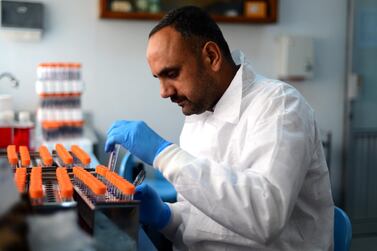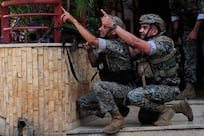Humanity has made extraordinary strides in the past few decades: we have been to the moon, invented robots to perform menial tasks and we can connect with loved ones on the other side of the planet with the click of a mouse. While these impressive feats of technology might capture more headlines, humankind's most life-enhancing achievements often go under the radar when they should, by rights, be celebrated equally. One such feat is the fight to eradicate poliovirus, more commonly known as polio.
Thirty years ago, a global public health effort led by a partnership of governments, institutions and charities spearheaded the fight to eradicate the virus. In 1988, a total of 350,000 people were inflicted with this crippling and potentially fatal disease. This year, that number has dropped by 99 per cent to just 33 new cases. People are still suffering from the effect of polio, which can lead to paralysis in one in 200 cases, a reminder that just one case of polio is too many. Not only does the disease endanger the life of the person who is infected, it also puts others at risk of contracting it. While there is no cure for those affected by polio, prevention is both easy and simple. A polio vaccine has been available since the 1950s and two inoculations are enough to protect a child for life. If the international community works together, it is possible to save every child in the world from its life-threatening condition.
Other infectious diseases have been successfully eradicated thanks to global campaigns for vaccination and prevention. This is how smallpox, a disfiguring and potentially fatal virus, has been scrapped from the face of the earth. We can make this happen for polio too. The disease has already been wiped out in most western countries for decades and there are only three countries in the world where it continues to spread: Pakistan, Afghanistan and Nigeria, although the last case of polio in Nigeria was detected in 2012. But the infectious disease can easily cross borders and put a whole population at risk. This is partly why it has been so difficult to eradicate in Pakistan and Afghanistan, as the two countries share a vast porous border that has been ridden with conflict and illegal crossings for decades. Limited access to communities, especially in areas struck by violence and poverty, is a leading cause of the failure to inoculate all of Afghanistan and Pakistan's children. There have also been cases of misinformation discouraging families from getting their children vaccinated. But polio is not just a national problem, it is a worldwide issue that knows no borders. Afghans, Nigerians and Pakistanis need the full support of the international community’s expertise and advice in countering this threat.
The UAE is one of the countries that heeded that call and has been at the forefront of the fight to eradicate the disease for good. Over the past five years, more than 71 million Pakistani children have been inoculated against polio, thanks to the Emirates Polio Campaign. This joint initiative between Pakistan and the UAE, launched in 2014 by President Sheikh Khalifa and Sheikh Mohamed bin Zayed, Crown Prince of Abu Dhabi and Deputy Supreme Commander of the Armed Forces, aims to eradicate the disease worldwide. Next month Abu Dhabi will host the second Reaching the Last Mile forum, a conference that will bring together more than 250 health experts to beat polio worldwide, in partnership with the Bill and Melinda Gates Foundation, through its Gavi Vaccine Alliance.
It will require a concerted global effort to resolve a transnational problem. On World Polio Day, let us remember that this is the end goal in sight. The world cannot afford to become complacent.






